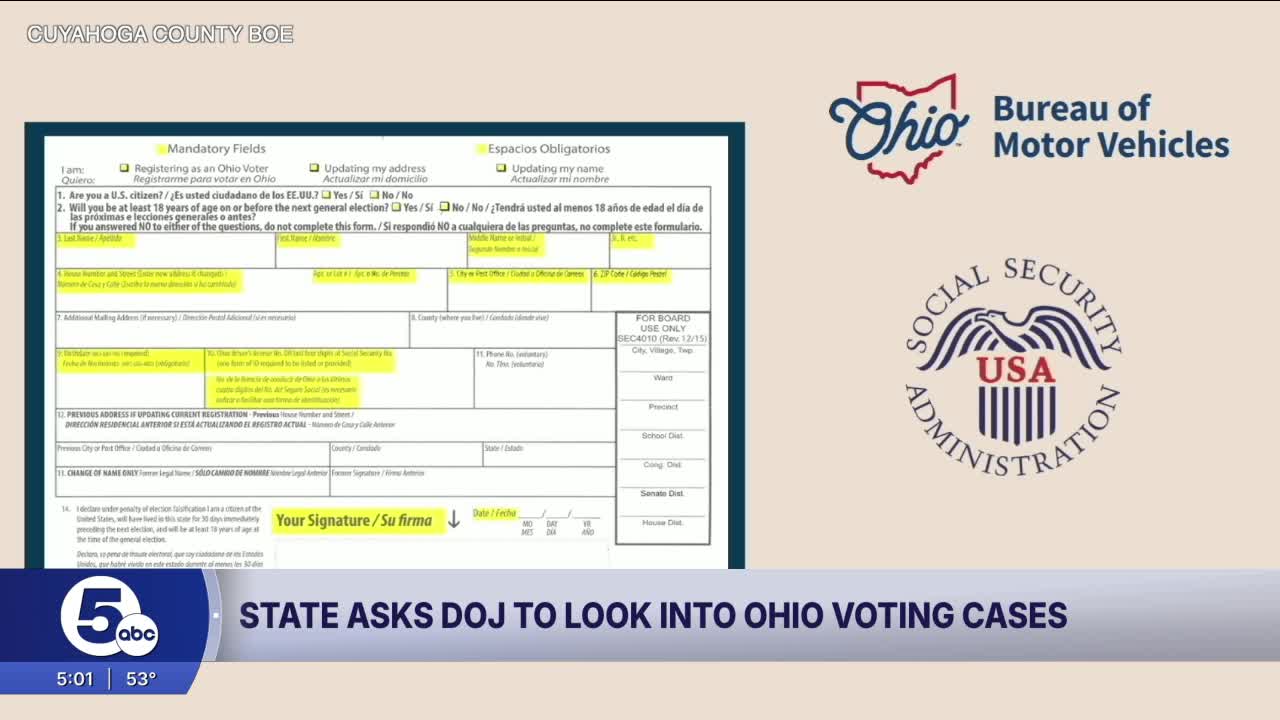CLEVELAND — One day after referring 1,200 criminal cases to the United States Department of Justice for consideration of federal prosecution, Ohio Secretary of State Frank LaRose is affirming his stance on the decision.
"It is a rare thing for people to commit voter fraud, but it is serious when it happens," LaRose told News 5. "We're talking about people that we have evidence broke the law as it relates to state election laws. Making sure that people know that we take election violations seriously in Ohio and that if you break the law, there will be consequences for doing so."
LaRose sent a letter and evidentiary materials related to 1,084 noncitizen individuals who appear to have registered to vote unlawfully in Ohio. This includes 167 noncitizens who appear to have also cast a ballot in a federal election, all of which occurred in the most recent four federal election cycles of 2018, 2020, 2022, and 2024. Additionally, Secretary LaRose is referring for consideration evidence of the following:
- 99 individuals who appear to have voted in two states in the same federal election
- 16 individuals who appear to have voted twice in Ohio in the same federal election
- 14 individuals who appear to have voted in a federal election after the date of their death
- 4 individuals who appear to have engaged in ballot harvesting
- 2 individuals who appear to have registered at a residence where they were not entitled to register
In September of last year, LaRose asked the Ohio Attorney General to look into 633 cases that had previously been sent to county prosecutors who had elected to pursue only a dozen of them. LaRose said those cases are included in his referral.
"Every one of these cases has been referred to county prosecutors, in some cases referred to the state attorney general and for whatever reason, they may not have been prosecuted yet. Well in those cases where the violation occurred in one of those even-numbered years when we have federal elections, that could also be a federal crime, so we referred it to the DOJ," he said.
As for the more than 1,000 noncitizens who appear to have registered to vote unlawfully in Ohio, that doesn't mean they were successful; it just means they filled out the application. In Ohio, though, when you fill out a registration form, the information is checked against the state BMV, the Social Security Administration and the Secretary of State's secure database. So just because a noncitizen fills out a form to register to vote doesn't mean they actually end up registered.
"Yes that's correct, (they) were caught and removed from the voter rolls long before they would have had an opportunity to cast a ballot," LaRose said.
But when you fill out the registration form, LaRose points out that you are attesting to being an American citizen.
"Just registering to vote as a noncitizen is in fact a crime; it's an even more serious crime if you register to vote as a noncitizen and then cast a ballot," he said.
Noncitizens actually voting is rare. In the 2020 election, out of 5.9 million votes cast in Ohio, only 13 were identified as noncitizens and referred for prosecution —the smallest percentage, 0.000002% of all votes cast. Proof he has cited in the past that the system is working. So does he think that the announcement that 1,200 people, dating back over seven years, are being referred for prosecution, makes the problem seem bigger than it is and undermines the success that Ohio has had in this area?
"No, not really and again, we're talking about a small fraction of the overall total, but a single vote can turn in an election," LaRose said. "Whether or not to bring charges will ultimately be up to the DOJ.
"This will be what's called prosecutorial discretion; it will be up to those federal prosecutors, just like it's up to the local and state level officials, to decide if they want to prosecute those cases. I am encouraging them to do so because again, it's kind of like jaywalking, right? If you don't think there's going to be consequences, well you're more inclined to do it."





